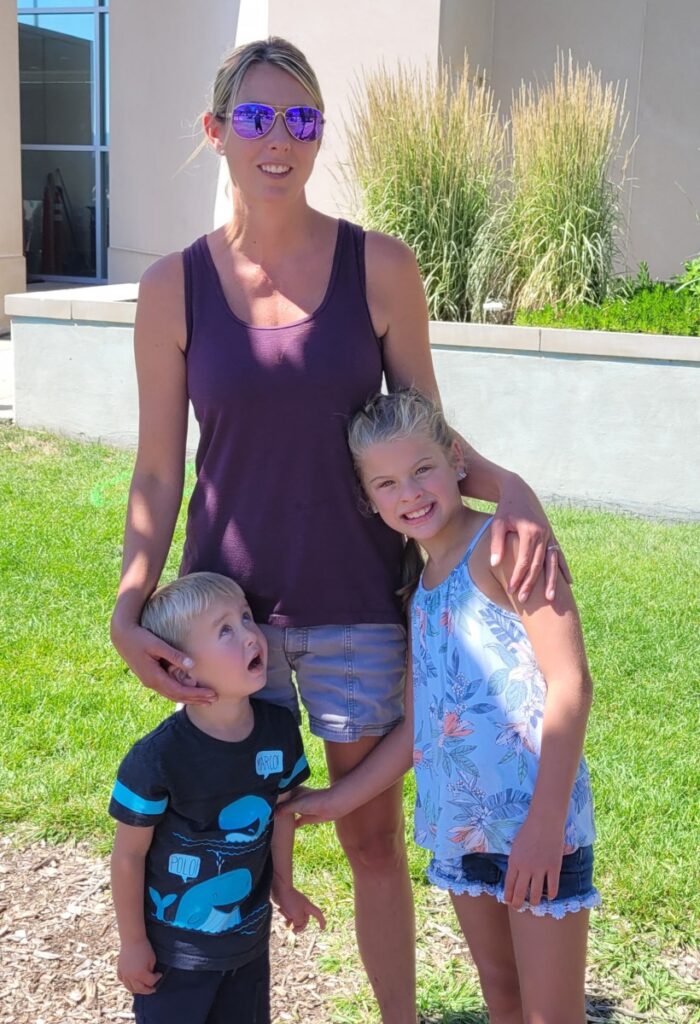 The scariest day of Alicia Sletvold’s life was the day her daughter was born. At 28 weeks pregnant, Alicia was used to feeling a little off due to the normal pains and discomfort of pregnancy. But after five days of consistent neck and chest pain and a throbbing headache, her doctor ordered a CT scan to investigate. The scan showed that Alicia had suffered an aortic dissection—a fatal occurrence when the inner layer of a weakened area of the aorta tears—and the possibility to save her and her unborn daughter’s life was uncertain.
The scariest day of Alicia Sletvold’s life was the day her daughter was born. At 28 weeks pregnant, Alicia was used to feeling a little off due to the normal pains and discomfort of pregnancy. But after five days of consistent neck and chest pain and a throbbing headache, her doctor ordered a CT scan to investigate. The scan showed that Alicia had suffered an aortic dissection—a fatal occurrence when the inner layer of a weakened area of the aorta tears—and the possibility to save her and her unborn daughter’s life was uncertain.
“The doctors in the emergency room told me I was going to die,” explains Alicia. “Honestly, they couldn’t figure out how I was still alive.”
A skilled OB and NICU team delivered Alicia’s daughter via C-section, and then she went immediately into open heart surgery with a specialized cardiac team. After two days in the ICU, Alicia transferred to an inpatient unit and was finally able to meet her two-pound baby girl, Avaya.
“The nurses on the floor called us the miracle family,” Alicia recalls. “It was a miracle we were alive. My doctor referred us to a genetic specialist because they wanted to further understand what caused my aortic dissection and why it happened.”
After genetic testing and an extensive recounting of family health history, they found Alicia had a very rare condition called Loeys–Dietz Syndrome. Loeys–Dietz Syndrome is a disorder that affects the connective tissue in many parts of the body. With the advancement of genetic research, there have been five types of Loeys–Dietz syndrome identified. Alicia has type 2 (TGFBR2), giving her daughter a 50% chance of having this condition as well.
“Thankfully my daughter doesn’t carry this genetic condition, but many of my siblings do,” Alicia explains. “My one sister didn’t get tested. She became pregnant and experienced the same traumatic dissection, and, sadly, didn’t survive—but her son, who my husband and I have adopted as our own, did survive and he carries the TGFBR2 marker.”
This diagnosis not only provided Alicia with better clarity on her condition, but it’s also helping to save the lives of her family members. Genetic testing allows a healthcare provider to design a more accurate, proactive, and impactful care plan for patients. Through precision medicine and evidence-based treatments, people diagnosed with genetic conditions will live longer, healthier, and more fulfilling lives.
“I know it can save people’s lives,” she says. “I’m proof of that. The specialized care my son is receiving at Logan Health Children’s is helping him live a better life. With the knowledge of our diagnosis, we have the resources we need for our family to thrive and stay healthy.”
In September 2022, Logan Health began enrollment for its inaugural Genomics Continuing Education Program, which includes a Genetics Fundamentals of Genomics Course and Genomics Fellowship Program. The curriculum aims to provide professional development and advanced education on prenatal, preconception, and pediatric genetic conditions, as well as adult genetic conditions and drug metabolism problems.
“Loeys–Dietz Syndrome is one of the disorders we’re currently studying in our curriculum, working closely with Alicia to ensure she and her family receive appropriate care to live full, healthy lives,” says Carrie Ann Thompson, DNP, APRN, ANP-BC, OCN, ACGN, Director of Logan Health’s Genomics Fellowship Program and Logan Health Genetics services. “This program not only provides education about various genetic disorders, it helps train providers on how to diagnosis certain disorders and how to make appropriate referrals to advance the care of the patient.”
Genetic counseling consults at Logan Health are currently a complimentary service, funded by nonprofit organizations and philanthropic support.
Give Today. Grow Healthier Tomorrows.
Extraordinary health care is not delivered alone, and it is not possible without philanthropic support. The lifesaving, continual care experienced by Logan Health patients is made possible through our medical expertise and the generosity of donors.
Your gift to the Logan Health Foundation directly supports our work to ensure continued excellence and innovation in health care for the communities we serve. Through your tax-deductible donation, you are helping build healthier futures, aiding access to care, and strengthening our communities.

